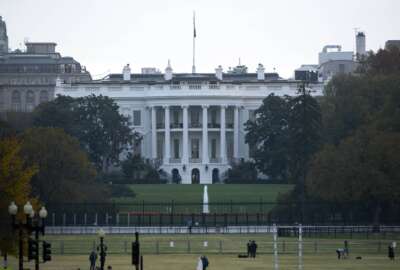The Biden appointees are already heading for the exit doors
Political appointees are starting to depart just a few weeks after the election and two months before the change in administration.
If you’re working at the higher ranks of civil service, you probably have noticed that political appointees are starting to depart just a few weeks after the election and two months before the change in administration. Federal sales and marketing consultant Larry Allen, who’s been watching it closely, joined the Federal Drive with Tom Temin to provide some highlights.
Interview transcript:
Tom Temin: And there have been some, well, your expertise is the General Services Administration, already happening there.
Larry Allen: That’s right. We’ve seen the head of the GSA Technology Transformation Service, Ann Lewis, say that she is departing. That’s not too much of a surprise, I think. Ms. Lewis came in to government from the private sector. She’s kind of been in and out of government for a while. She’s done a lot of things that Technology Transformation Service. I’m not sure whether or not some of them are complete by the time that she’s leaving. But she certainly has attempted to move the TTS ball forward during her time at GSA. And we’ll just have to see where that goes in the next administration.
Tom Temin: They’ve had some wins and some misses, I guess you might say, which is, I guess, about what most federal programs are capable of.
Larry Allen: Well, that’s accurate, and I think that’s also fair. One of the big things that they stood up under her tenure was the login.gov program that certainly had its rollout problems and congressional oversight. But overall, it seems to be working well now. And a lot of that, I think, is due to the tenacity of Ms. Lewis and her colleagues at TTS. So they’re to be commended for that. And also looking for ways to use facial recognition technology in government, and do it in a responsible way. And that’s probably not as far along. But the fact that it’s being addressed, and we’re understanding better how to use it is another check.
Tom Temin: All right. And then a couple of departures at the Cybersecurity and Infrastructure Security Agency over at Homeland Security.
Larry Allen: That’s right. These are going to come at the inauguration. However, they’ve already been announced. So this is Jen Easterly, who runs TTS and her deputy, who both announced last week that they’re going to be leaving CISA. There’s some discussion about what CISA will become in a new Trump administration, not just who will run it, whether or not the current scope of the CISA organization will remain the same, whether it will somehow be melded into other parts of what the Department of Homeland Security is doing. It’s all very speculative at this point, Tom. So we’ll have to see. What we do know is that in the case of CISA, as well as GSA’s TTS, and other organizations that find their politicals heading for the exits, they’re going to be left in very capable hands, capable hands of acting careerists who understand their organizations by and large, and who in most cases are experienced with seeing this quadrennial change of political appointees.
Tom Temin: I think that under the Biden administration in the last four years, government employment, the number of federal employees I read, has grown about 120,000. They haven’t all been to CISA, but CISA kind of came from nascency to really a lot of growth, hundreds of people.
Larry Allen: Right. Well, I think you can expect to see the incoming administration take a hard look, not just at CISA staffing levels, but staffing levels throughout government. We already know from published reports that looking at the growth in federal bureaucracy is something that this incoming administration wants to look at, make sure that we’re getting efficiency out of not just whoever we’re employing, but whatever the government is trying to do in terms of missions. And that’s probably not a bad thing to have that taken a look at on a regular basis. You want those midyear reviews, whether you’re in government or industry, to make sure that you’re still on the right track.
Tom Temin: We’re speaking with Larry Allen, president of Allen Federal Business Partners. And more prosaically, there’s been a lot of developments getting back to GSA in their IDIQs, their OASIS+ professional services in particular. What’s the latest development there and what should industry make of it?
Larry Allen: Well, I think there are a couple of developments on OASIS+. And first, I want to commend GSA’s OASIS+ team for being exceptionally transparent. They’ve been consistently communicative throughout the OASIS+ development and now contract award processes. So kudos to them. But that doesn’t mean that they can prevent protests. And in fact, there have been a couple of different types of protests lodged against OASIS+ contracts. Mostly we’ve seen these in the areas where GSA has announced awards, which are a couple of the small business tranches for the OASIS contract. And while a number of those initial pro tests have been resolved or withdrawn, Tom. There are four that still remain. And one in particular, I’ve been told, may take a little while to resolve. For one thing, it was filed a little bit later than some of the others, and that matters for a couple of reasons. One, is the OASIS+ people have not made awards to the unrestricted portion of OASIS, which is going to be much larger in terms of number of companies, and will probably bring with it its own requisite protest actions. You can predict that just like you can predict the supermoon that we had last week. So that matters because the ordering time for the baseline OASIS contract, the one that OASIS+ will replace, that ends in just about a month. And GSA so far has been adamant that they will not expand the ordering term for the original OASIS. Well, they may have to if they’ve got major parts of OASIS+ still bogged down by unresolved protests, they’re not going to be able to launch OASIS+ and they’re not going to be able to launch it on anything approaching an even playing field. If you can award some companies and give them the authority to operate, but not everybody gets a chance to proceed because parts of the contract are still being protested. I don’t think that’s going to work. So I think that we can expect to see some announcements here from GSA despite what their public approach has been particularly. You do, as I predict, see protests for the OASIS+ unrestricted portion of the contract.
Tom Temin: It wouldn’t be the first time they’ve had to extend a legacy contract.
Larry Allen: No, it would not. And I think it’s important to understand that while the GSA and other agencies that are in the same boat do apply for, and are usually granted extensions, it’s not a process that is automatic. There has to be documentation. You have to make your case to the senior procurement officials in your agency. You have to make sure that you’ve got a path to award the new contract as soon as possible so that you’re not just keeping something going in perpetuity because the new one never quite get ready. So it’s something that requires work on behalf of the people who would seek the extension. And I think that’s one of the reasons why they’ve been reluctant to do it at GSA because they’d rather spend those resources on getting the new awards out.
Tom Temin: In the meantime, the NASA SEWP VI, that is eagerly anticipated. That’s back on it’s deadline a little bit also.
Larry Allen: They’d seen it’s been backed up Tom. It’s been backed up because the substantial number of industry comments and questions when the original RFP came out, and NASA SEWP, not a large program office, they have had to spend some time responding to literally thousands of different questions or clarification requests. To their credit, they’ve now also become very transparent and said just recently, you can expect two more tranches of responses to the original questions. And then we’re going to issue a new amendment to the solicitation. Left unsaid is when the due date for those modified offers is going to be. All we know is that NASA said that the original or the current due date for around that’s Dec. 18, that’s going to be pushed back. So we’re definitely looking for something that’s going to be in the new calendar year. The SEWP traditionally has been able to overcome its protests in a timely manner and be able to make contract awards. I hope that they are successful with that once again.
Tom Temin: And when you get that many questions from industry, sounds like a case for a large language model chat bot answer.
Larry Allen: AI can be used in government acquisition, Tom. And I imagine that the people at NASA are looking at just that.
Copyright © 2025 Federal News Network. All rights reserved. This website is not intended for users located within the European Economic Area.
Tom Temin is host of the Federal Drive and has been providing insight on federal technology and management issues for more than 30 years.
Follow @tteminWFED






